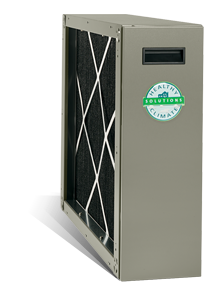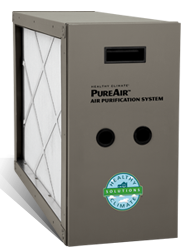Air Filtration Systems
 An air filtration device is any device that uses a filter to capture particles in a systems air stream. There are many types of filter material. The effectiveness is measured by a formula called MERV (Minimum Efficiency Reporting Value). The higher the MERV, the better. They provide a cleaner and healthier home environment and extend the life of your air conditioning system.
An air filtration device is any device that uses a filter to capture particles in a systems air stream. There are many types of filter material. The effectiveness is measured by a formula called MERV (Minimum Efficiency Reporting Value). The higher the MERV, the better. They provide a cleaner and healthier home environment and extend the life of your air conditioning system.
Aprilaire MERV – 11 Media Filter
A cabinet containing a pleated media filter. It captures up to 85% of dust, dirt and other particles throughout your home. The filter media needs to be replaced every 6-12 months. Call us to have it maintained today.
Lennox Carbon Clean 16
This is the #1 rated MERV 16 media filter on the market. The media is a carbon coated fiber that removes up to 95% off allergy-aggravating particles as small as .3 microns. This is the same level used by hospitals for general surgery areas. The filter media needs to be replaced every 6-12 months.
Air Filtration and Purification Systems:
 These devices perform as an air filter, but also purify the air in your home by using various processes.
These devices perform as an air filter, but also purify the air in your home by using various processes.
Lennox Pure Air System
This system cleans the air in your home better than any other single system you can buy. It contain a MERV-16 media filter, 2 55-Watt UVA lamps and a metal insert that is activated by the UVA light. It is the only system to attack all three classes of contaminants in you home: small breathable particles, air-born mold, bacteria and viruses, and odor or chemical vapors. The media filter, UVA lamps, and metal insert need replacement every year.
Aprilaire 5000
This consists of a media filter and ionized metal insert, it captures up to 98% of particles down to one micron in the filter. The activated metal insert then kills the captured bacteria and spores that had been in your homes environment.
Let’s Discuss Your Options
There are many types of systems to choose from. Contact Scott-Lee Heating to discuss your air filtration and purification system needs. We will help you determine which system best fits your needs and budget. Call us at (314) 756-9444 for a free consultation.
Frequently Asked Questions
Why are air filtration and purification systems important?
Air filtration and purification systems are crucial for improving indoor air quality by removing pollutants, allergens, and contaminants. They help create a healthier living environment, reduce respiratory issues, and enhance overall well-being.
What is the difference between air filtration and air purification?
Air filtration involves trapping particles such as dust, pollen, and pet dander using filters. Air purification goes a step further by using technologies like UV light or ionization to neutralize or eliminate bacteria, viruses, and other harmful microorganisms.
How do I choose the right air filtration system for my home?
When choosing an air filtration system, consider factors such as the size of your home, specific air quality concerns (allergies, asthma), filter types (HEPA, activated carbon), and system efficiency. Consulting with a professional can help you make an informed decision.
How often should I replace the filters in my air filtration system?
The frequency of filter replacement depends on the type of filter and the level of pollutants in your home. Generally, HEPA filters should be replaced every 6-12 months, while activated carbon filters may need replacement every 3-6 months. Check the manufacturer’s recommendations for best results.
Can air purification systems remove viruses from the air?
Yes, certain air purification systems, especially those using UV light or HEPA filters, can effectively capture and neutralize viruses. However, no system guarantees 100% removal, so it’s important to combine air purification with other hygiene practices.
Are there any benefits to using a whole-house air filtration system?
Whole-house air filtration systems provide comprehensive air cleaning for your entire home, ensuring consistent air quality in all rooms. They integrate with your HVAC system, offering convenience and improved efficiency compared to standalone units.
What are the maintenance requirements for air filtration and purification systems?
Maintenance requirements include regularly replacing filters, cleaning the system components, and scheduling professional check-ups to ensure optimal performance. Proper maintenance extends the life of the system and maintains air quality.
How do air purifiers help with allergies?
Air purifiers help with allergies by removing common allergens such as pollen, dust mites, pet dander, and mold spores from the air. HEPA filters are particularly effective in capturing these particles, reducing allergy symptoms and improving comfort.
Can I use air purifiers in conjunction with my HVAC system?
Yes, air purifiers can be used in conjunction with your HVAC system to enhance air quality. Whole-house air purifiers are designed to integrate with HVAC systems, while portable units can be used in specific rooms for targeted air cleaning.
What are the energy costs associated with running an air filtration system?
The energy costs of running an air filtration system depend on the type and size of the unit. Generally, modern systems are designed to be energy-efficient. Check the energy ratings and consider models with energy-saving features to minimize costs.
Are air filtration systems noisy?
The noise level of air filtration systems varies by model and design. Most systems operate quietly, but some high-efficiency units may produce noticeable noise at higher settings. Look for systems with noise ratings if quiet operation is important to you.
How do I know if my air purifier is working effectively?
You can tell if your air purifier is working effectively by monitoring the air quality in your home, checking filter indicators, and noting any reduction in allergy symptoms or odors. Regular maintenance and following the manufacturer’s guidelines ensure optimal performance.
Can air filtration systems help with mold issues?
Yes, air filtration systems, especially those with HEPA and activated carbon filters, can help reduce mold spores in the air. However, addressing the source of mold growth and controlling humidity levels are also essential for effective mold management.
What is a HEPA filter and how does it work?
HEPA (High-Efficiency Particulate Air) filters are designed to capture 99.97% of particles as small as 0.3 microns. They work by trapping airborne particles in a dense mat of fibers, making them highly effective for removing dust, pollen, and other allergens.
Why should I consider Scott-Lee Heating Company for my air filtration and purification needs?
Scott-Lee Heating Company offers expert advice and professional installation of high-quality air filtration and purification systems. Our team ensures that your system meets your specific needs and provides ongoing support for optimal performance and air quality.
